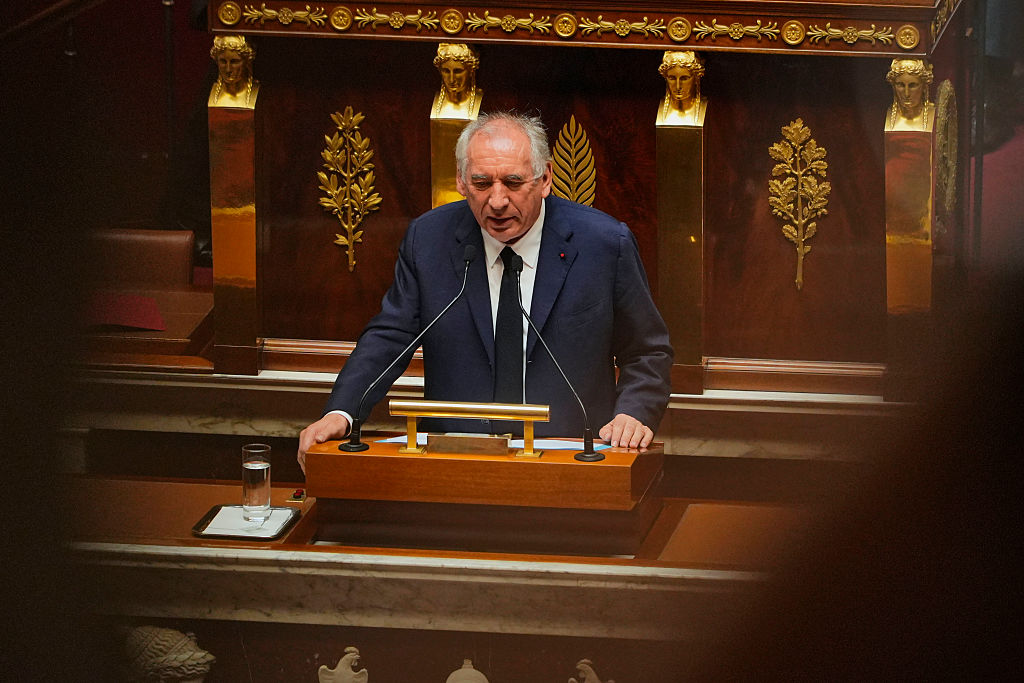Prime Minister François Bayrou’s government has collapsed after a bruising no-confidence vote in the French National Assembly. MPs rejected his budget by a margin of 364 votes to 194, with 25 abstentions, forcing his resignation and plunging Emmanuel Macron’s second term into chaos. On Monday evening, the Élysée released a statement saying that Macron has ‘taken note’ of Bayrou’s fall and will name his successor ‘in the coming days’. The president will meet Bayrou to formally accept his government’s resignation. But naming a new prime minister without calling elections risks prolonging the very deadlock that has brought the country to this point.The defeat marks the unravelling of Macronism – the president’s promise to hold the centre and block Marine Le Pen’s National Rally now lies in tatters as France faces deepening political and economic turmoil.
What started as anger over Bayrou’s budget is now fuelling demands for a general election and even calls for Macron’s resignation
The lost confidence vote leaves Macron with a dilemma: dissolve the parliament and call new elections to break the deadlock, or muddle on with no clear majority in parliament and no new budget. Either path carries heavy consequences. New elections would weaken Macron irreversibly, but refusing to act deepens the paralysis. Meanwhile, the deficit is increasing, the National Assembly remains paralysed, and the crisis, both economic and political, shows no sign of ending.
The left refuses any cuts to public spending and demands higher taxes on the wealthy. The right insists on sweeping reductions and rejects new taxes entirely. Bayrou tried to chart a middle course. His budget was a carefully balanced plan of modest, targeted spending cuts. He proposed trimming subsidies, freezing some public-sector hiring, combined with limited tax rises on the very wealthy and on big corporations. The budget was designed to reassure Brussels, calm investors, and keep the deficit under control without provoking unrest on the streets. It was Macron’s grand compromise. He tried to avoid deep reforms that would alienate the left, avoid punitive tax hikes that would enrage the right, and hold the fragile centre together.
But the middle ground satisfied no one. For the left, any cut was an attack on the welfare state. For the right, any new tax was unacceptable. And with neither side willing to concede, Bayrou’s plan collapsed. By tying the budget to a motion of confidence, Bayrou gambled on commanding a majority he never had. That gamble has cost him his job. Perhaps he underestimated how dramatically the political balance has shifted. Perhaps both Bayrou and Macron missed that Marine Le Pen and the National Rally sensed an opportunity to convert frustration with the deadlock into real power. They may have anticipated that the National Rally would abstain in today’s vote, as it has in many of the motions of no confidence in recent months, rather than vote against. But they badly miscalculated.
For the time being, Macron is avoiding calling a general election, even though it’s the only way to produce a working majority. He knows what an election would deliver. Every opinion poll shows the National Rally well ahead. Dissolution would almost certainly put Jordan Bardella into Matignon as prime minister. As National Rally spokesman Sébastien Chenu put it this week: ‘Give us a majority so that we can have stability with Jordan Bardella.’ Bardella would run the government, Le Pen would tighten her grip on the 2027 presidential race, and Macron would spend the rest of his term in cohabitation with his fiercest opponents – the ultimate humiliation for him. It’s no wonder he’s hesitating.
Marine Le Pen seized the moment in parliament today, calling on Macron to dissolve the assembly to end what she described as France’s ‘institutional paralysis’. A president, she declared, ‘is never wrong to turn back to the people. Dissolution is not a whim; it is an institutional lever to break the deadlock and to allow democracy to work.’
Without new elections, any alternative appears unworkable. France faces €44 billion in needed budget cuts to tame its deficit, with Brussels pressing for fiscal discipline and investors driving up bond yields to 3.2 per cent. The National Assembly remains deadlocked, unable to pass any legislation. Whoever succeeds Bayrou, if Macron appoints a replacement swiftly, will inherit the same fractured parliament, the same irreconcilable demands, and a similar fate. A socialist would face swift ouster by the right, while a centrist would merely tread water, grappling with Bayrou’s challenges. Macron might opt for a caretaker government to buy time for compromise, but such a stopgap, unable to propose a budget, is unlikely to survive or forge a viable middle ground.
Meanwhile, the political deadlock is spilling into the streets. As I wrote in The Spectator last week, the Bloquons Tout movement, a loose grassroots coalition similar to the gilets jaunes is calling to ‘block everything’. It will begin its protests on Wednesday. Then, from next week, on 18 September, the major unions will join with coordinated national strikes. What makes Bloquons Tout especially dangerous for Macron is its unpredictability. It has no central leadership, operates via encrypted networks, and thrives on flash blockades, refinery occupations, and rolling disruption. It’s designed to paralyse infrastructure before the state can respond. Major unions joining the protest will only amplify this.
What started as anger over Bayrou’s budget is now fuelling demands for a general election and even calls for Macron’s resignation. Yet Macron, who has vowed to serve out his term and is constitutionally protected until 2027, is unlikely to step down. His refusal, for now, to dissolve parliament is exacerbating the political crisis, turning economic discontent into a broader challenge to his leadership.
And while the streets raise the political cost of waiting, the markets raise the financial one. Investors are nervous, pushing up borrowing costs. The pressure is rising not just in parliament and on the streets, but in the bond markets too. Fitch has already warned of ‘heightened risks’ to France’s creditworthiness. Moody’s has flagged concerns over the rising deficit and the political paralysis. A downgrade is increasingly likely. As one MP warned this week: ‘The spiral of debt makes our democracy powerless and threatens our sovereignty. The more our debt grows, the more financial markets will be able to influence our politics.’ A downgrade will push up borrowing costs, widen the €44 billion gap, and make the next round of budget decisions even more painful. What Bayrou failed to fix will become harder to repair.
Macron has made one strategic miscalculation after another. After stumbling in the European elections in July 2024, he chose to dissolve the National Assembly, betting that voters would return him a working majority. They didn’t. Instead, he left himself with a fragile bloc, dependent on ad hoc deals to govern and permanently exposed to defeat in confidence votes. That misstep has hung over every decision he’s made this past year, including his appointments of Élisabeth Borne, Michel Barnier, and François Bayrou. Each of the three prime ministers failed to find the compromise Macron needed. The numbers simply didn’t work. Macron has spent his second term trying to stitch together unstable coalitions, but each has collapsed under the weight of irreconcilable demands from left and right. No matter which way he turned, there was no parliamentary arithmetic that could sustain his centrist project.
Dissolving parliament a second time would risk effectively handing power to the National Rally, which is why Macron wants to avoid it, but it’s necessary to break the deadlock and move the country forward. The longer Macron waits, the weaker he becomes, and the more likely it is that events will force his hand.
France is now poised to pay the price of Macron’s hesitation. What he should be doing right now is calling new parliamentary elections. If he fails to do so the cost of his procrastination will be felt on the streets, as demonstrations intensify and public anger grows. It will be felt in government, where the absence of a budget risks paralysing ministries and undermining authority. And it will be felt in the markets, where a downgrade of French debt will make the next budgetary exercise even more brutal than this one.
In short, the president must put France’s interest before the interests of what’s left of Macronism. The president must acknowledge the fact that the country now needs a general election and no more hesitation or short-term fixes. Macron must accept that further procrastination, including the appointment of a new prime minister, will only deepen the crisis and prolong the deadlock.








Comments